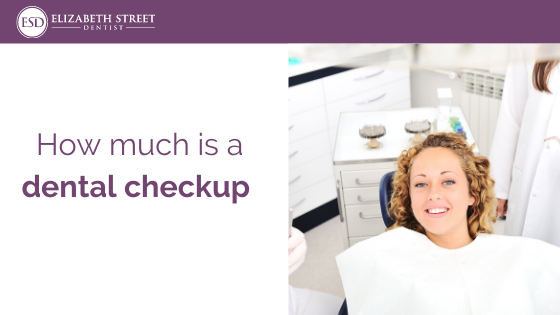
How much is a dental checkup
Posted by: Dr Monica Amin
No matter how meticulously you brush and floss every day, regular check-up visits to your dentist are necessary to enjoy good oral hygiene and a pearly white, beautiful smile. In this blog post we look at the costs of a dental checkup, however please note that whilst we mention NHS we are a fully private dentist.
Why Dental Check-ups are Necessary?
While brushing and flossing daily is good for your oral health, these measures are sometimes not enough to prevent teeth cavities and gum problems. This is because – despite your best efforts – the bristles of a toothbrush or the thread of floss are unable to penetrate and clean the hard-to-reach areas between the teeth.
As a result, plaque gradually starts to accumulate in these regions, leading to a variety of problems such as periodontal inflammation and teeth cavities, ultimately this could lead to tooth loss!
Routine dental check-ups allow your dentist to diagnose and treat dental problems at an early stage – even before they are visible to the naked eye – so that they don’t have any serious effect on your oral health.
Many practices also offer fresh breath clinics.
What Can I Expect During a Dental Check-up?
During a routine check-up visit, your NHS or private dentist will perform a detailed clinical examination to assess your oral health status and to diagnose any underlying problems that may create problems in the future.
Here’s what you can expect during a routine check-up appointment:
Consultation
First, your dentist will ask how your general physical and dental health have been since your last check-up appointment. He or she will also enquire about whether you have changed or started taking any new medication.
Thorough Clinical Examination
During a check-up appointment, your dentist will perform a detailed clinical examination to assess the over status of your teeth, gums, and any other existing dental restorations. Usually, a clinical examination also includes x rays of your teeth or jawbones from various angles, so that your dentist can visualise any underlying periodontal problems, teeth cavities or cysts.
Teeth Cleaning
At every check-up appointment, your dentist will perform a professional cleaning, also called a scale and polish procedure, to remove plaque and tartar deposits from your teeth and minimise chances of development of gum inflammation and teeth cavities. Teeth cleaning is performed by using an ultrasonic scaler, which vibrates at a very frequency and removes adherent plaque and tartar deposits. Once the dentist has cleaned your teeth, he or she will polish them to prevent re-adherence of food debris and bacteria.
Private dentists will usually have a dental hygienist to undertake this side of the treatment.
Advice
During a check-up, if the dentist observes any habit – such as tooth grinding or tongue thrusting – which can lead to dental problems in future, he or she will explain to you the associated risks to your oral health and suggest treatment or preventive measures to minimise the damage. During a check-up appointment, if a dentist observes teeth cavities which are developing due to an unhealthy diet, he or she will provide guidance regarding tooth-friendly foods that help improve oral health.
Suggesting Treatments
If your dentist finds any underlying problems, he or she will explain the available treatment options and guide you in selecting one that is most suitable for your dental needs.
Fluoride Treatment
For some patients, who are at a higher risk of developing teeth cavities, your dentist may provide topical fluoride treatment. Fluoride has been shown to be very effective in preventing, even arresting teeth cavities.
The difference between private dentistry and NHS dentistry
The primary differences between NHS and private are that of time and allocated resources. NHS dentists will often have much shorter appointment times, typically around 15 min. Private dentists will usually have minimum appointments of 30 min, sometimes 45 min. This allows private dentists for more time to perform a more detailed clinical assessment, undertake a more thorough cleaning and give more time to discuss possible treatments and give advice.
Do Dentists Check for Throat Cancer?
An oral cancer screening is a visual and physical examination of the oral cavity, head and the neck the region. Your dentist will perform cancer screening at every check-up appointment to ensure that there no symptoms or apparent problems that may point towards an underlying cancerous lesion.
During the screening procedure, your dentist will visually observe the oral cavity, the head and the neck region for any swellings. Afterwards, he physically “feels†all the lymph nodes and head and neck regions for swellings. If your dentist finds any suspicious swelling, he or she will send it to the laboratory for biopsy to confirm diagnosis.
How Many Times Should You See a Dentist in a Year?
According to the National Health Service (NHS) the frequency of dental check-ups required in a year mainly depend on your oral hygiene status. The higher your risk of dental problems, the higher is the frequency of check-ups in a year. People who have good oral health usually need to visit after every 12 months, while those who have more dental problems might need to visit after every 3 months. Generally, it’s a good idea to see your dentist at least twice a year.
Dental Check-up Cost
After a check-up appointment, if your dentist has recommended some dental work such as a filling, crown, or cosmetic dentistry, then you need to factor-in the dental cost as well. The cost of a check-up or dental treatment in England depends on various factors. The foremost question is whether you have a dental insurance, or you’re paying from your own pocket.
Secondly, treatment costs vary between NHS and private treatment. If you’re paying for your treatment through the NHS, then you need to consider the NHS banding for dental treatment included in your diagnosis.Â
If you’re going to a private dentist in Victoria, Pimlico or Chelsea, make sure that you confirm that the practice is covered by your insurance provider. Routine examinations typically start from around £65.
Routine dental check-ups not only offer long term protection from dental problems, but also save you from investing your time and money in seeking treatment for problems which can could have been easily prevented in the first place. So, mark your calendar you now and Remember to visit your dentist on your next scheduled appointment.
Do this, and you reduce the risk of needing more expensive treatment in the long run.
It’s not dentistry that’s expensive, it’s neglect!
- Tooth Gems – Why You Should Avoid Them - 28th January 2024
- Why Do I Have Black Lines On My Teeth? - 31st December 2023
- Invisalign®. We Answer Some Of The Most Popular Questions - 28th October 2023

